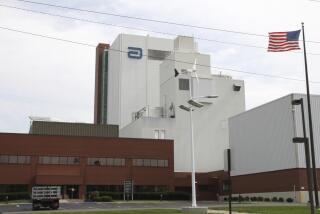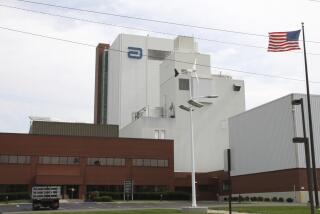Carnation to Move Into U.S. Baby Formula Market
- Share via
Carnation Corp., a unit of Swiss food giant Nestle SA, on Friday confirmed plans to enter the $1.6-billion U.S. infant nutrition market.
Sources on Wall Street said Carnation plans to sell an infant formula that is already being marketed in Europe by Nestle. The formula is sold as a powder and is designed for babies who are allergic to milk, said Larry Feinberg, an analyst with Drexel Burnham Lambert in New York.
Carnation refused to discuss the product until a July 14 press conference, saying only that it would form the cornerstone of a new nutritional product division.
Carnation, based in Los Angeles, is best known for its ice cream and milk. It was acquired by Nestle, one of the world’s largest producers of coffee, chocolate and infant formula, in 1984 for $3 billion.
The tactics used by Nestle to sell infant formula in poor nations triggered a six-year boycott of its products in this country. The boycott ended after Nestle agreed in 1982 not to distribute free products to poor mothers, and to drop most consumer advertising.
Boycott leaders contended that many infants who were raised on formula were malnourished because their impoverished mothers diluted the costly formula to make it last longer.
Nestle has never sold infant formula in the United States, where the market is firmly controlled by large pharmaceutical companies.
The stock prices of U.S. infant formula makers fell Friday on word of Nestle’s plans.
Shares in Abbott Laboratories, the maker of Similac, Isomil, and other formulas, closed at $45.125, down $1.875, in composite trading on the New York Stock Exchange.
Bristol-Myers shares closed at $41.25, down $1.50, also on the NYSE. Bristol-Myers makes Enfamil and ProSobee formulas.
Shares in the maker of SMA formula, American Home Products, closed at $74.875, off 62.5 cents on the Big Board.
The infant formula market has grown between 8% to 9% yearly, said Eileen Brill, editor of the Lempert Report, a food marketing newsletter.
Currently, Abbott Laboratories is the industry leader, with 55% of the market, followed by Bristol-Myers with 35% and American Home Products with 10%.
The introduction of a powdered formula would be an unusual step, since 98% of formula sold in the United States is liquid. However, Nestle seems optimistic about the product; according to Feinberg, it expects to capture 25% to 30% of the U.S. market over the next several years.
More to Read
Inside the business of entertainment
The Wide Shot brings you news, analysis and insights on everything from streaming wars to production — and what it all means for the future.
You may occasionally receive promotional content from the Los Angeles Times.










